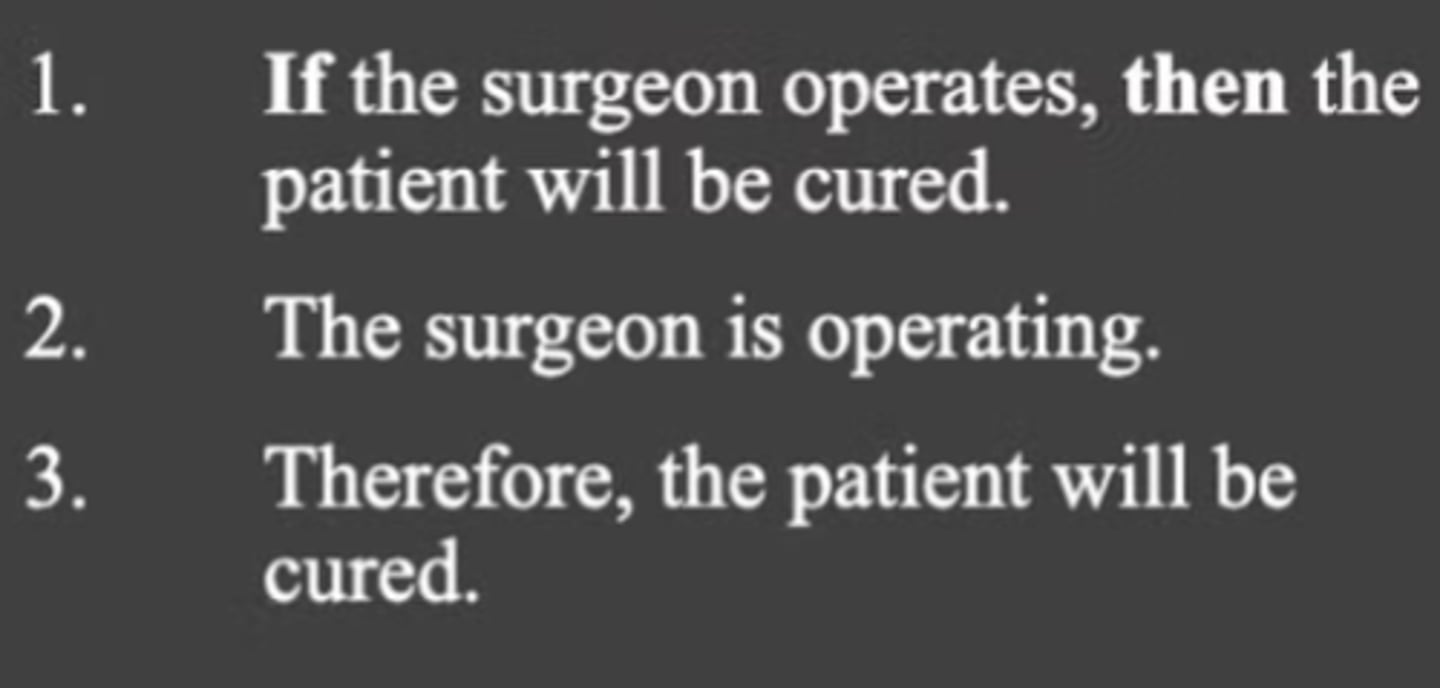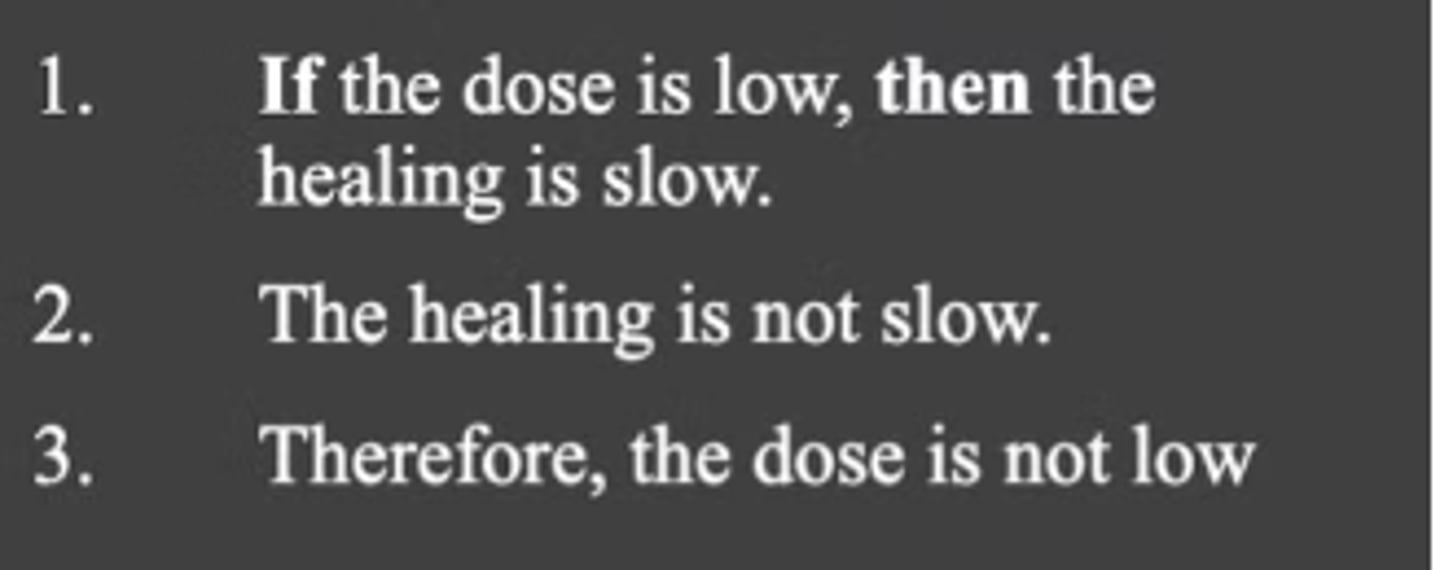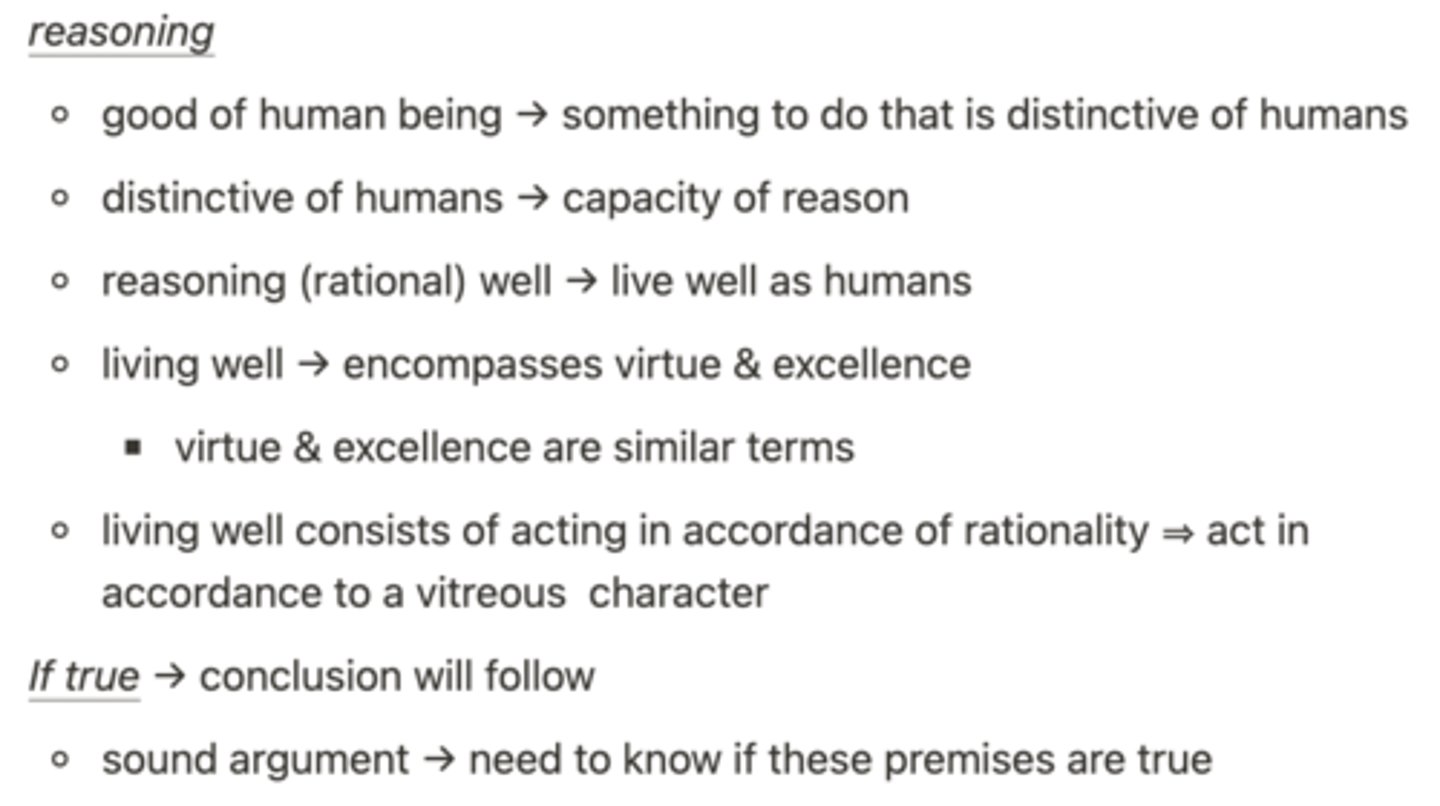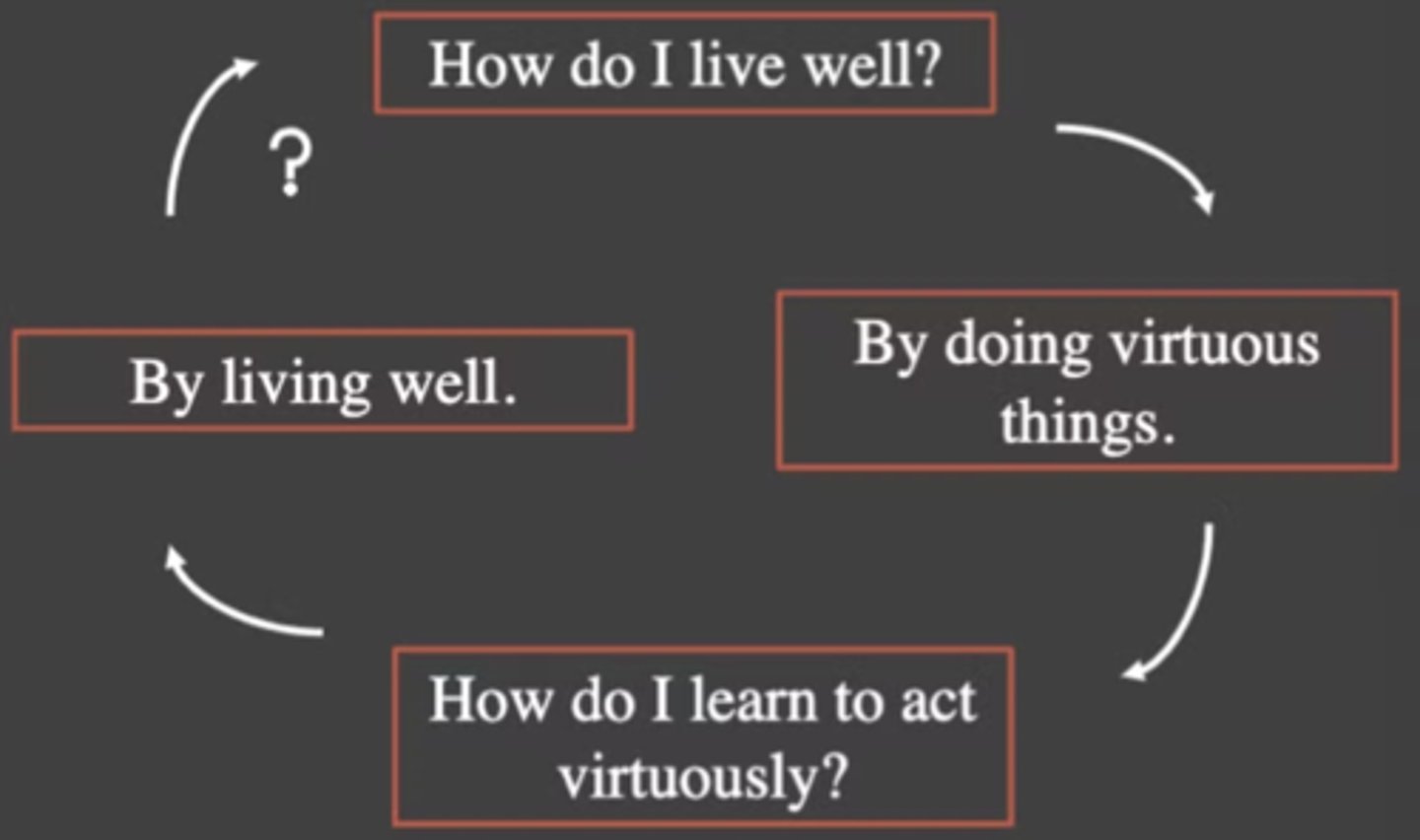PHIL 333 Midterm
1/301
There's no tags or description
Looks like no tags are added yet.
Name | Mastery | Learn | Test | Matching | Spaced |
|---|
No study sessions yet.
302 Terms
moral principles
(overview)
either absolute or prima facie
includes:
- principle of autonomy
- principles of beneficence
- principle of utility
(utilitarianism)
- principle of justice
absolute
(moral principle)
applies absolutely to all cases, no exceptions
prima facie
(moral principle)
applies generally, but there are exceptions
principles of autonomy
(moral principle)
rational agent has the capacity of self determination
- prima facie
- cannot interfere with one's autonomy
example
pandemic → autonomy was overruled (choice to self isolate)
principle of beneficence
(moral principle)
idea you should do good to people and avoid harm
parts
- active (--)
- non(--)
do care = minimize harm
- some harm is sometimes unavoidable
active beneficence
(parts; principles of autonomy; moral principle)
promote doing good
nonbeneficence
(parts; principles of autonomy; moral principle)
minimize harm
principle of utility
(moral principle)
do more good than bad (promote benefit over harm)
- generally applied
principle of justice
(moral principle)
people should be treated fairly
includes: distributed (-)
distributed justice
(principle of justice; moral principle)
we should distribute good in society
- I.e. healthcare
ethical theories
(overview)
what makes the action/person right/wrong or good/bad
includes:
- utilitarianism
- deontology
- virtue ethics
deductive arguments
intended to Guarantee the truth of the conclusion
requirements
- valid
- sound
valid
(deductive argument requirement)
true outside the context
- not always sound
- hypothetical constraint
- structural/formal feature
sound
(deductive argument requirement)
has true premises / evidence to support the premises
- must be valid
validity + true premise = (-)
* if an argument is (-) → then its guaranteed to be true
conditional premise
(deductive argument)
If p, then q
valid arguments (forms):
- modus ponens
- modus tollens
antecedent
(conditional premise, deductive argument)
"If p"
consequent
(conditional premise; deductive argument)
"then/therefore q"
valid arguments
(deductive reasoning; conditional premise)
see if the argument aligns with the "if p, then q" structure
- Modus Ponens
- Modus Tollens
Modus Ponens
(valid arguments; conditional premise; deductive reasoning)
If p, then q
- conclusion cannot be false when suppose the premise (p) is true
- supposing always true

Modus Tollens
(valid arguments; conditional premise; deductive reasoning)
no, q, then can't have p
- if we don't have p, then we can't have q
breakdown
1. if p, then q
2. not-q
3. therefore, not-p

invalid arguments
(conditional premise; deductive reasoning)
1. affirming the consequent
2. denying the antecedent
affirming the consequent
(invalid arguments; deductive reasoning)
possible that the conclusion is false even if the premise is true
- conditional premise only tells us what happens if the first is satisfied
- tells us nothing about what happens if the consequent is satisfied
(I.e. maybe the drugs are unnecessary because the case is hopeless)
*inverse of modus ponens*
example
1. if the patient is getting better, then the drugs are unnecessary
2. drugs are unnecessary (Q)
3. therefore, the patient is getting better (P)
having q, does not guarantee p
explanation
- premise means that whenever the patient is getting better (P), it necessarily follows that the drugs are unnecessary (Q).
In other words, if P is true, then Q must also be true
Denying the Antecendent
(invalid arguments; deductive reasoning)
truth of "not P" does not necessarily imply "not Q."
There may be other reasons for Q to be true even if P is false
- I.e. third variable
*not p does not guarantee not q*
(inverse of modus tollens)
example:
1. if the rate of infection is increasing, then the patients will die
2. the rate of infection is not increasing
3. therefore, the patients will not die
- false conclusion: there could be another cause
- i.e. could die from another cause
moral arguments
an argument whose conclusion is a moral statement (right/wrong or good/bad)
Parts
1. moral premise
2. nonmoral premise
components
- valid
- sound
example
1. it is wrong to take the life of an innocent person
- moral premise
2. abortion takes the life of an innocent person
- nonmoral / descriptive premise
3. therefore, abortion is wrong
moral premise
(parts of moral arguments)
right/wrong component
example
- it is wrong to take the life of an innocent person
nonmoral premise
(parts of moral arguments)
descriptive premise
- action under the moral umbrella
example
- abortion takes the life of an innocent person
moral theory
explains why an action is right or wrong or why a person is good or bad
provides us with criterions
- it tells us what it is about an action that makes it right, or what it is about a person that makes them good
includes
1. theories of right action (what makes an action good/bad)
- utilitarianism
- deontology
2. Virtue-based theories
- virtue ethics
(emphasis on character of a person)
consequentialism
(moral theory)
does something because it leads to something happening
includes
- utilitarianism
Mill
Utilitarian Theorist
utilitarianism
an action is right iff its consequences are at least as good as the consequences of any alternative action open to the agent
- based on happiness
IFF ⇒ if and only if
The greatest happiness principle
The greatest happiness principle
(Mill; utilitarianism)
tells us if action is right / wrong
Actions are right in proportion as they tend to promote happiness, wrong as they tend to produce the reverse of happiness.
- happiness = intended pleasure + absence of pain
- unhappiness = pain + privation of pleasure
includes
- welfarist
- hedonistic
- universalist
- impartialist
welfarist
(greatest happiness principle; utilitarianism)
the only thing that counts toward net value is well-being
- only thing that’s intrinsically valuable is well-being
hedonistic
(greatest happiness principle; utilitarianism)
Welfare is constituted by one’s level of happiness
Happiness is determined by subtracting total pains from total pleasures
- pleasure is intrinsically valuable
⇒ good in and of itself (good for its own sake / not because it leads to something else)
*pain is intrinsically disvaluable*
Universalist
(greatest happiness principle; utilitarianism)
Takes the welfare of all individuals (affected by action) into account when calculating the utilities of actions
Impartialist
(greatest happiness principle; utilitarianism)
Considers each unit of welfare equally
- everyone’s pleasure counts equally
utilitarianism asks us to step back and be (-)/unbiased
happiness
(utilitarianism; Mill)
only intrinsically valuable thing according to Mill
objection to Mill
(utlitarianism)
“the happiness which forms the utilitarian standard of what is right in conduct, is not the agent’s own happiness, but that of all concerned. As between his own happiness and that of others, utilitarianism requires him to be as strictly impartial as a disinterested and benevolent spectator”
- If we just try to promote pleasure, how are we any better than a pig rolling in dirt (which is having fun)
- is that really the core of morality is us doing only what brings us pleasure
response to mill
(utilitarianism)
“it is better to be a human being dissatisfied than a pig satisfied; better to be Socrates dissatisfied than a food satisfied”
- the objector has misunderstood human nature (we don’t just get pleasure from immediate pleasure)
- humans have faculties greater than animals
pleasures
(higher/lower; utilitarianism)
vary in quantity and quality
- not about getting the most (-)
- some are better than others
humans are capable of pleasures that swine are not capable of (mental, as opposed to bodily)
Evidence
- no intelligent human would swap to be an animal or a fool
higher pleasures
(utilitarianism)
mental / intellectual
example
- listening to music, art, meaningful conversations
lower pleasures
(utilitarianism)
bodily sensations
Proof of Principle of Utility
(utilitarianism)
1st principle & so “incapable of proof by reasoning”
“the sole evidence it is possible to produce that anything is desirable, is that people do actually desire it…No reason can be given why the general happiness is desirable, except that each person, so far as he believes it to be attainable, desires his own happiness”
sole evidence comes from experience
- own experience → want something because you think it’ll make you happy
- logic → if I desire my happiness, then my happiness is good for me
- happiness is good b/c people desire it
all other things desires are part of happiness:
- thinks happiness is the only intrinsic good/valuable thing
- thinks it’s impossible to desire anything other than happiness
- all other actions/desires are directed towards achieving happiness
types of utilitarianism
Act & Rule (-)
Act utilitarianism
rightness of actions depends solely on the relative good produced by Individual actions
- apply it case by case
- greater net happiness
an act is right if in a particular situation it produces a greater balance of good over bad than any alternative acts
- action is right → leads to good
Rule utilitarianism
focuses on rules governing categories of actions rather than specific acts
- importance of moral rules that govern classes of actions rather than singular, particular actions
- what rule should we follow? → that will lead to greatest happiness
a right action is one that conforms to a rule that, if followed consistently, (that rule) would create the most beneficial balance of good over bad for everyone involved
2 part process
1. apply principle of utilitarianism to rule
2. assess particular actions in how they fall under the rule
- action is right if it conforms to rule → rule is right if leads to → leads to good / happiness
Immanuel Kant
Deontology theorist
Deontology
(Kant)
motive behind the action matters, consequences are irrelevent
- Categorical
Good Will = intrinsically valuable
From duty/for duty vs in accord to duty
- do it because it’s right, not because what it leads to
- following rational, categorical goal
- categotical imperative
moral duties of deontology
(Kant)
If there are (-), they would bind all possible rational beings (universally) and they would do so categorically (without exception)
- good will → universal/categorical
- no exceptions
good will
(deontology; Kant)
unconditionally valuable
- only unconditionally good thing there is
it’s goodness does not depend on what it brings about
- good in itself
- not good because of the consequence
(motive matters)
good will (theorist)
(deontology)
only intrinsically valuable thing according to Kant
happiness is only good if accompanied by a (-)
Duty
(good will; Deontology; Kant)
types
1. in accord with (-)
2. from (-)
- morally reasonable
in accord with duty
(types of duty; good will; deontology; kant)
the right things to do, but for independent reasons, I want to do
- based on the consequence
- not morally reasonable
example:
charges same amount for everyone (what you should do) even though he could get away with it, but he doesn’t (act in accord with duty), BUT why does it do it → b/c he wants to get a good reputation
morally reasonable
(types of duty; good will; deontology; kant)
doing something because it is the right thing to do (from duty) and no other reason
- morally valuable in itself
from duty
(morally reasonable, types of duty; good will; deontology; kant)
to do something because it is the right thing to do (no other reason)
- only these actions have moral worth / morally valuable
- no other motivation needed
(other motivates are purely contingent)
Kantian View of Action
(Deontology)
In performing action A my action is accompanied by a maxim
- if you’re acting deliberately → reason why your doing something
*motive is the maxim that outlines an action's intention aligning with "from duty" that constitutes good will
maxim
(Kantian View of Action; Deontology)
subjective principle I adopt in doing what I do
gives us a way to differentiate mere reaction (I.e. why did you break your leg → no reason) vs intended action (defined by (-))
maxim form
(Kantian View of Action; Deontology)
I will do act A in circumstances C for end E
Example
I will turn up to class (A) on Thursdays at 1230 (C) for the end of achieving a good grade (E)
good will & maxim
(Kantian View of Action; Deontology)
An action is expressive of a “good will” when the maxim behind (intention) is because it has the form of a law
- not consequential
- actions with moral worth are done from the concept of law (I.e. from duty)
rational commands (imperative)
(deontology; Kant)
2 kinds
1. hypothetical imperative
2. categorical imperative
hypothetical imperatives
(deontology; Kant)
“If ___, then do ___.”
- conditional form
- do action b/c it'll get you that result
- dependent on the end you want
(consequential)
categorical imperative
(deontology; Kant)
“Always do (or refrain from doing)___.”
- no "because"
- just do it because you are commanded/ required
(no other reason)
supreme principle of morality (Kant) → will take this form
Kant suggests that there is only one (-) but restated in different ways:
- universal law formulation
- human law formulation
Kant's supreme principle of morality
(categorical imperative; deontology)
form: categorical imperative
- no exceptions
- just the right thing to do → its your duty / from duty
- do something because you are compelled by the moral law
Laws of Categorical imperative
(Deontology; kant)
1. Universal Law formation
2. Formula of Humanity
Universal Law Formulation
(laws of categortical imperative; Deontology; kant)
“act as though the maxim of your action were to become, through your will, a universal law of nature.”
a maxim has the form of a law if you could will for it to be acted by all rational being (universalizable)
- maxim is universalizable = permissible
- maxim is not universalizable = impermissible
maxim as a law
(Universal Law Formulation; categortical imperative; Deontology; kant)
forms a law...IF you can will that all beings act on it
(universalizable)
universalizable = morally permissible
not universalizable = morally impermissible
acting according to maxim
(Universal Law Formulation; categortical imperative; Deontology; kant)
when you act deliberately
maxim test (succeeding)
(Universal Law Formulation; categortical imperative; Deontology; kant)
morally permissible test
1. is it possible that everyone can act on that maxim
2. is it consistant that everyone can act on it
3. can I will/want that to be the case
reasoning
- being a moral agent binds you to universal, rational laws
maxim failing test
(Universal Law Formulation; categortical imperative; Deontology; kant)
1. Contradiction in conception
- could not consistently conceive the maxim of being a universal law
2. Contradictions in the will
- do not want to will it
Contradiction in conception
(Maxim failing; Universal Law Formulation; categortical imperative; Deontology; kant)
not consistently conceive the maxim of being a universal law
- fails if it cannot be universalized
- generates perfect duties
Example: Lying Promise
lying promise
(example; contradictions in conception; maxim failing; Universal Law Formulation; categortical imperative; Deontology; kant)
Background
ask friend to lend money and promise to pay them back, but have absolute no intention of paying them back
morally permissible?
1. Find maxim
- I will make a lying promise when I am in difficulty, to help myself
2. universal?
- can I will everyone to act in that manner (universal)
3. conclusion
- contradiction in conception → cannot conceive that world
- because everyone is lying in order to gain, but no one would gain because no one would perceive the law ⇒ maxim destroys itself if it becomes a universal law
perfect duties
(contradictions in conception; maxim failing; Universal Law Formulation; categortical imperative; Deontology; kant)
duties you always have / obligations that bind every action
- apply all the time
typically negative in character
- ex: do not lie/harm innocents/harm yourself
if they fail the categorical imperative, then you can never do them
counter argument of perfect duties
(contradictions in conception; maxim failing; Universal Law Formulation; categortical imperative; Deontology; kant)
problematic because it generates duties that may seem contrary to what seems right to do
Morality of lying
- some instances, is it okay to lie?
- Kant’s response → cannot lie ever
- if you lie, your are responsible for consequences b/c you didn't uphold your duty of honesty
Rationale
- not everyone has rationale thinking, but you as a moral agent has to do your duty regardless of others
Contradictions in the will
(maxim failing; Universal Law Formulation; categortical imperative; Deontology; kant)
maxim fails if it could be universalized, but don’t want it to be universal
- don’t will for it to be a universal law
- not impossible to conceive, but impossible to want
- generates imperfect duties
imperfect duties
(Contradictions in the will; maxim failing; Universal Law Formulation; categortical imperative; Deontology; kant)
duties that apply in general, but not all the time
- often positive in character
example
- morally good thing to do (helping others), but not obligated to help others in every instance
formula of humanity / humanity law formulation
(laws of categortical imperative; Deontology; kant)
“act in such a way as to treat humanity, where in your own person or in that of anyone else, always as an end and never merely as a means.”
- treat a person as an end in themselves = respect the person as a rational agent
source of moral obligation
- comes from humanity
- we are rational human beings
treat someone as an end
(formula of humanity; laws of categortical imperative; Deontology; kant)
respect the person as a rational agent
why
- moral obligation comes from humanity
- we are rational human beings
example
person has consented → respecting their humanity / rational capacity to choose
- professors are using students as a means for employment
- students use professors as a means for credits
to treat someone as a mere means
(formula of humanity; laws of categortical imperative; Deontology; kant)
when don’t respect them / value their intrinsic worth as humans
Example
1. lying promise
- person cannot consent to treatment because of deception, so they cannot truly make an informed decision themselves
2. suicide
Aristotle
virtue ethics theorist
- highest good = intrinsically valuable
- Virtue Ethics starts from the question “How shall I live?” or “What kind of person should I be?”
(character of the person)
we are not just naturally morally good or bad
- some control to live morally good lives
(control to become virtueous)
nicomachean ethics (book 1)
(Aristotle; Virtue Ethics)
Begins with an account of “the good”
- everything is aiming towards something
highest good is not good for the sake of anything else
the good
(virtue ethics; Aristotle)
what everything under human control aims at
- everything is aiming towards something
the end ⇒ “the good”
Example: everything we do is with a purpose in mind & that purpose is the end of that action
- the end of ship building → is a ship
- the end of coming to class → getting a good grade
highest good
(nicomachean ethics; virtue ethics; Aristotle)
not good for the sake of anything else
- good all by itself
eudaimonia
eudaimonia
(nicomachean ethics; virtue ethics; Aristotle)
highest good for humans
- if you have this, you have everything you need for a good life
synonyms
- happiness
- flourishing
- blessed
happiness is self sufficient, makes life worth having by itself
Aristotle's happiness
more general
- eudaimonia ⇒ living well → flourish
- self sufficient
Mill
- simply pleasure
self sufficient
(Eudaimonial virtue ethics; aristotle)
all by itself, it will make life worth living (good live)
a happy life
(virtue ethics; eudaimonia; aristotle)
the life of action
- life of practically wise person → person who acts in social & political settings
- in order to become good →nature of actions, namely how we ought to do them
- how we ought to do thing → how we should think/ reason to put morality into action
(& life of study)
function
(function argument; virtue ethics; Aristotle)
“purpose”
Aristotle thought everything as a purpose
- to humans → something unique to us as human beings = rationality
Function Argument
(virtue ethics; Aristotle)
1. The highest good of a thing with a function is performing that function well (excellence in function).
2. The function of human beings is acting in ways that express rationality.
3. (Interim Conclusion) Excellence in rational action is the highest good of human beings.
4. Acting from virtuous character is constitutive of excelling in rational action.
5. (Conclusion) The highest good of human beings is acting in accordance with virtuous character

Virtues
(virtue ethics; Aristotle)
excellence
⇒ states that cause their possessors to function well (to be excellent)
2 types
- (-) of thought
- (-) of character
Virtues of thought
(types of virtues; virtue ethics; Aristotle)
e.g. wisdom, comprehension, open-mindedness, curiosity, etc
- these come mostly form teaching
- through education…I can become more (ex:) wise
virtues of character
(types of virtues; virtue ethics; Aristotle)
e.g. generosity, bravery, honesty, truthfulness, magnanimous, etc
- these come from habituation (practice) → to become good
- cannot be taught for (bravery, generous, etc), get from practice
Virtues are character traits
Dispositions to think, feel, & act in the right/appropriate ways in the right/appropriate circumstances
- vices
aim at the “mean”
- mean b/w excess & defect = vices
vices
(characteristic traits; virtues ethics; aristotle)
bad character traits
- too little/much virtues turn into these
- need to consider circumstances
- not all are virtues

becoming good
(virtue ethics; aristotle)
Practice
- some control
think of becoming virtueous as a practical skill
circularity worry
(virtue ethics; aristotle)
response to how to live well?
- practice
- trial & error
knowing that vs knowing how

knowing that
(circularity worry; virtue ethics; aristotle)
knowledge of propositions / statements
ex: instructions
limitation
- knowing steps of how to ride a bike doesn't give you the ability to ride a bike
knowing how
(circularity worry; virtue ethics; aristotle)
practical knowledge (the ability to do something)
- practice
becoming virtuous
(virtue ethics; Aristotle)
letting rational part of brain govern irrational part of brain & overcome feelings of rationality
how
by practicing doing what virtuous agents do
practice it enough → becomes habitual
- prudence
- temperance
prudence
(becoming virtuous; virtue ethics; Aristotle)
knowledge of what is good/bad for humans
- similar to supreme virtues
temperance
(becoming virtuous; virtue ethics; Aristotle)
proper regulation of one's desires, pains/pleasures
- in the right way
intrinsically valued between theorist
(overview)
Mills = happiness
Kant = goodwill
Aristotle = highest good